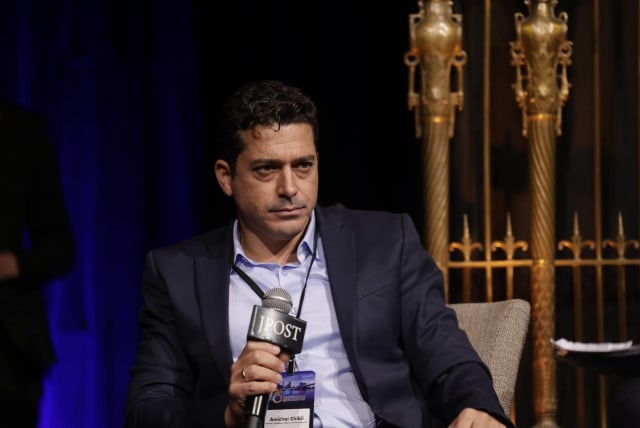Chikli: Pro-Palestinian protesters' calls for retribution on Israel are not justified

The Jerusalem Post Podcast with Tamar Uriel-Beeri and Zvika Klein.
The calls for justified retaliation by pro-Palestinian protesters on US campuses don't hold water, Diaspora Affairs and Combatting Antisemitism Minister Amichai Chikli told Zvika Klein and Tamar Uriel-Beeri on The Jerusalem Post Podcast.
"You cannot pretend that October 7 didn't happen," he said. "You cannot stand next to a sign that says 'Decolonization by all means necessary' and pretend that you don't understand what that means."
Addressing the protests on US campuses, Chikli noted that he was caught off-guard by their sheer magnitude.
"We saw what was going on at US campuses, it's not a new phenomenon," Chikli said. He cited different events such as Apartheid Week and the presence of activist organizations such as Students for Justice in Palestine (SJP) and Jewish Voice for Peace (JVP).
"We are well aware of the platforms and core ideology of these organizations," the minister said, but added he was still caught off-guard. "I wasn't thinking that we're going to see such massive movements, such violence, and for so long. That's the surprising part."
Chikli discussed the recent focus on campus antisemitism, including the Congressional hearing where the heads of Penn State, MIT, and Harvard failed to say they would condemn calls for genocide against Jews. While the president of Columbia University did unequivocally oppose calls for genocide against Jews, there is still a sense of hesitation at clearing out the protest encampments at Columbia and other campuses.
Here, Chikli criticized university leadership.
"The picture that we're seeing in some faculties is that many staff members [are also] joining the protesters," he said. "I have no expectations from the leadership of these universities."
Regarding understanding these protesters, the minister cited the book The Psychology of Totalitarianism by Mattias Desmet, which discusses why people willingly give up freedom.
"Lack of social connections, social isolation, lacking meaning in life. These feelings create anxiety and frustration, and that is the foundation that pushes these young people to become part of this mass formation," Chikli said. "That provides them with an immediate sense of belonging, an immediate sense of meaning.
"I think this is very crucial to understand what we're seeing currently. It's not just ideological, but it's also a psychological phenomenon."
He continued: "I think that one of the most fascinating images that we saw was last week... where there was an interview with one of the protesters, a young girl, and she was asked what she was protesting against. She asked her friend, who responded that they wish they were more educated on this issue."
Jerusalem Post Staff speak out about campus antisemitism
Also on the podcast, several members of the breaking news desk shared their thoughts about the ongoing anti-Israel protests on US campuses.
"I can't imagine what it's like to be a student on campus right now," said desk and finance reporter Eve Young, a graduate of American University in Washington. "Some have good intentions, some have bad intentions, but there's so much desire to do something. But I can't imagine what it's like to be a Jewish student or an Israeli student experiencing that. It must be really, really challenging."
Young further argued that it reflected a loss of trust in institutions.
"Why do people protest? Because they feel there's no other way to make a change. I think we're seeing a lot of that in our generation," she said. "I think there's truly a horrific amount of antisemitism at these protests but I think there's also a really big desire to live in a world that treats people well."
"A lot of it feels like privileged students wanting to jump on the bandwagon to have a glamorized oppression experience," said breaking news desk editor Mathilda Heller, a graduate of the University of Exeter. "Sometimes privileged students feel left out from oppression and so they almost fetishize that experience."
Jerusalem Post Store
`; document.getElementById("linkPremium").innerHTML = cont; var divWithLink = document.getElementById("premium-link"); if (divWithLink !== null && divWithLink !== 'undefined') { divWithLink.style.border = "solid 1px #cb0f3e"; divWithLink.style.textAlign = "center"; divWithLink.style.marginBottom = "15px"; divWithLink.style.marginTop = "15px"; divWithLink.style.width = "100%"; divWithLink.style.backgroundColor = "#122952"; divWithLink.style.color = "#ffffff"; divWithLink.style.lineHeight = "1.5"; } } (function (v, i) { });

